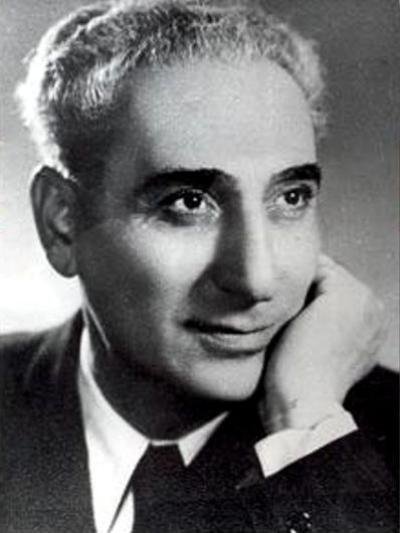Shara Talyan: Saro at the 1939 World's Fair
Written by Jesse Kenas Collins
For the third time in the Sound Archive series, we are exploring material from the Museum's collection of Soviet Armenian recordings. In previous posts, we've discussed a variety of artists representing the diversity of Soviet Armenian music, from folk styles to the Western classical tradition. We’ve touched on the conservatory and state ensemble structures (which codified aesthetic standards set from Moscow among state-affiliated musicians), as well as some individuals, like Tatul Altunyan, who formed and ran the state ensembles.
Here, we look at an operatic star who rose to prominence through the Soviet system. In contrast to Shah Mouradian, who found success from recordings and opera house tours throughout America and Europe, Shara Talyan was one of the foremost operatic stars of Soviet Armenia. Beginning his career as a tenor and later transitioning to baritone, Talyan exemplified the Western classical music ideal, named as a People's Artist of the Armenian SSR in 1939. That same year, the USSR pressed a special run of recordings for the World’s Fair in New York, featuring Talyan singing from the opera Anoush.
Talyan was born in Tbilisi, Georgia, in 1893, to a family of well known ashughs, or folk singers. His father, Ashugh Jamali (Mkrtich Talyan), a composer, singer, and santur player, was the constant bandmate of the more famous Ashugh Jivani for many decades. In fact, Jivani’s wife, Ashkhen, was Jamali’s sister, and their father, Hovhannes Talyan, was the owner of “Taloyan’s Coffeehouse” in Alexandropol (Gyumri), a major venue for ashugh performances. Hovhannes owned the coffeehouse with his brother Karapet, whose son Grigor, in turn, became the equally famed Ashugh Sheram (Shara Talyan became one of the most important preservers of Sheram’s orally composed songs, committing them to the page in the Western medium of staff notation). Hovhannes and Karapet, in turn, were themselves the sons of Ashugh Kyamili (Baghdasar Talyan), a troubadour from Kars, Turkey, who had migrated to Yerevan after the Russian annexation of Eastern Armenia. As a side note, the surname Talyan (originally Taloyan) came from Kyamili’s mother Talita, nicknamed “Talo,” the revered family matriarch; thus Talyan is one of the rare examples of a matronymic surname in Armenian culture.
After studying with teachers including Grigor Suni and Spiridon Melikyan (himself a student of Komitas), Shara Talyan established a career as a church soloist and organized an ashug group in Yerevan. Ultimately, Talyan served as a founding member of the Armenian National Opera Theater (now the Yerevan Opera Theater).
While still a student at the Nersisyan Armenian School in Tiflis, Talyan originated the role of Saro in the debut production of the opera Anoush, which was performed in Alexandropol, in August, 1912. The opera, composed by Armen Tigranian, is based on a nineteenth century poem by Hovhannes Tumanyan. It tells the story of a young peasant girl who falls in love with a shepherd, Saro. Their affair ends in tragedy when Saro humiliates her brother Mossy by pinning him in a wrestling match, violating the etiquette of a friendly game. Saro and Anoush run away together but Mossy tracks them down and ultimately kills Saro. Anoush is a beloved opera which still belongs in the repertoire of Armenian opera houses today..
Perhaps due to the opera's national significance, the USSR included an excerpt from it on the record presented here. Recorded in Yerevan in 1938, Talyan is accompanied by the Armenian State Opera and Ballet Theatre Orchestra conducted by Mikael Tavrizian. It was released in 1938 and reissued a year later on the special New York Fair label. As one of only twelve countries which held a national pavilion at the 1939 World's Fair, the USSR used the opportunity to showcase their highest cultural outputs. Alongside Talyan's record, the 1939 Fair saw the debut of products like nylon and an "electric calculator," as well as historic objects and paintings by Vermeer and Rembrandt.
Saro's Aria titled, Bartsr sarer (High mountains), is featured here in two parts, just like it was presented on the World's Fair disc. The recording not only celebrates Shara Talyan as an accomplished performer in his own right, but stands as a document produced for the world stage to illustrate Soviet Armenia's contributions to the operatic canon.
Portrait of the singer Shara Talyan (Image source: Wikipedia)
A special thanks to the SJS Charitable Trust for their generous support of our work to digitize and share our collection of 78 rpm records.


